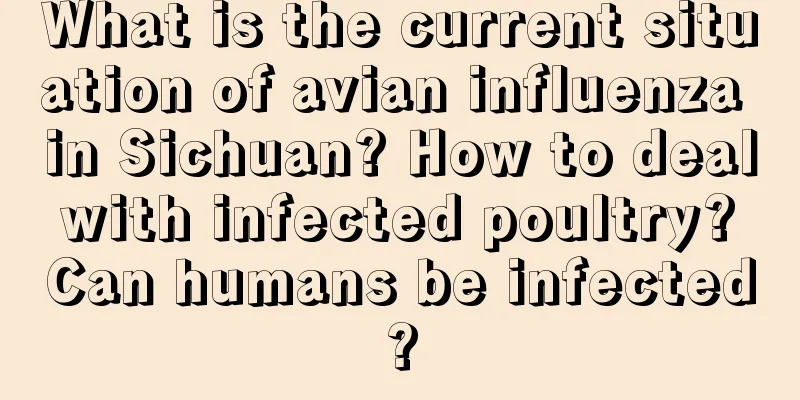What is the current situation of avian influenza in Sichuan? How to deal with infected poultry? Can humans be infected?

|
Recently, according to the Ministry of Agriculture, avian influenza has occurred in Sichuan. What is the current situation? How to deal with infected poultry? Can humans be infected with avian flu? How should it be prevented? Let’s take a look! According to the website of the Ministry of Agriculture and Rural Affairs, the Information Office of the Ministry of Agriculture and Rural Affairs announced on February 9 that an outbreak of highly pathogenic avian influenza of the H5N6 subtype occurred in poultry in Xichong County, Nanchong City, Sichuan Province. According to the report of the China Animal Disease Prevention and Control Center, the National Avian Influenza Reference Laboratory confirmed that an outbreak of highly pathogenic avian influenza of the H5N6 subtype occurred in poultry raised in a farm in Xichong County. The farm had 2,497 poultry on hand, and 1,840 of them died of the disease. After the outbreak, local authorities have effectively handled the epidemic in accordance with relevant plans and technical specifications for prevention and control. 2,261 poultry have been culled, and all diseased and killed poultry have been disposed of harmlessly. Can humans be infected with avian flu? Humans can be infected with avian influenza. Although it is the poultry that are sick, humans can become infected if they come into contact with or eat the sick poultry. How to prevent avian flu? 1. Do not come into contact with dead poultry, including not slaughtering, selling, transporting or eating dead poultry. Special attention should be paid to strengthening the education of children and teenagers, and they should try to reduce contact with poultry, especially sick and dead poultry. 2. If you find dead poultry, do not handle it on your own. Report it to the agricultural, animal husbandry, veterinary and health departments in a timely manner and dispose of it harmlessly in accordance with regulations. 3. People who develop symptoms such as fever and cough after contact with dead poultry should go to the nearest medical institution in time and actively inform the doctor of the contact with dead poultry. 4. Winter and spring are the peak seasons for respiratory infectious diseases. Everyone can strengthen their exercise and improve their physical fitness. Open the windows at home more often to promote indoor air circulation; wash your hands frequently, pay attention to personal and environmental hygiene, and reduce the chance of contracting respiratory infectious diseases. Now is a critical moment. I hope that breeders and purchasing groups will pay great attention and prevent such incidents from happening again. |
>>: Chen Beibei: What are the benefits of search engine optimization?
Recommend
Introduction to Moutai: How to avoid malicious clicks on advertisements when promoting corporate websites
For most companies or products, they would like t...
Windows 8/8.1 is growing rapidly: XP is on the way out
According to the latest statistics from market re...
Academician Zhang Fusuo: There is great potential for green development of agriculture
Editor's note: General Secretary Xi Jinping p...
Analysis of WeChat Reading Products
This series of articles may reach nearly 50,000 w...
Late-night blockbuster! Google releases the most powerful AI model Gemini, which "beats" GPT-4 in 30 benchmark tests
After much anticipation, Google's most antici...
Will I definitely learn some cool skills if I go to a big bat company?
[[143894]] A classmate said that he went to Alipa...
How much does it cost to customize a catering mini program in Hezhou?
How much does it cost to customize a catering min...
The National Day routine is here, I won’t tell ordinary people about it!
The annual National Day holiday is coming! Are yo...
Yogurt, probiotics, and prebiotics are very different. How much do you know? Let's understand them together
Objectively speaking, yogurt, probiotics, prebiot...
The electromagnetic guns in the movie are used to fight aliens, while our electromagnetic guns are used to put out fires.
There was a scene like this in the movie "Tr...
A brief discussion on the principle of WeChat QR code scanning login
Preface Hello everyone, I am programmer Amu! When...
2021's Technological Hexagram: Zhen: Playing Hide and Seek in the Metaverse
The ideas of science fiction novels are often app...
How much does it cost to develop a geotechnical building materials app in Changchun?
There are two types of WeChat applet development ...
A rare spectacle! Over 100 million
Hundreds of millions of eggs develop into adults ...
Eating less sugar can really prevent cancer!
This article was reviewed by Dr. Guo Xiaoqiang, a...









